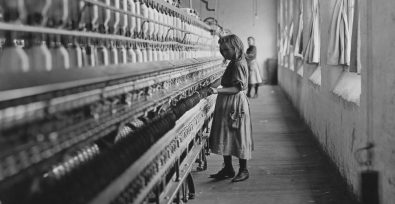The UN World Day Against Child Labor on June 12th focused on the release of the 2025 global estimates and trends of child labor. This is a joint report by the International Labour Organization (ILO) and the United Nations Children’s Fund (UNICEF) that provides a comprehensive assessment of global progress toward the elimination of child labor. But in the US, educators are sounding the alarm about the child labor law rollbacks currently sweeping across the nation, reports the National Education Association (NEA). And they’re raising serious concerns about students’ well-being and education going forward.
What happens when the safety nets are gone?
According to the UN, the percentage of children in child labor is highest in lower-income countries. However, the actual numbers of children in labor are higher in middle-income countries. And out of the 84 million children estimated to be working in child labor, 56% of all those actually live in middle-income countries with an additional 2 million living in high-income countries like the US. Coupled with the recent child labor law rollbacks across 28 states, educators are increasingly seeing the warning signs of stress, fatigue, and burnout in students.
Alan Yuodsnukis, a longtime educator in central Maine, a state that recently voted against the rollbacks said:
“Employers are looking to fill entry-level, hourly positions, and young people are a convenient source of labor. A lot of [my students], given the choice, will choose paid work over academic work—it’s hard to compete with that.”
In addition to longer work hours on school nights, the protections being removed allow entry into hazardous jobs. Jobs like working on construction sites and in poultry plants. They also allow teens to be paid subminimum wages. All of these red flags are raising serious concerns about the effects on students’ well-being and education. One educator said, “They just are too tired to come to school.”
“Our children are not responsible for rescuing our economy”
During the Industrial Revolution, it was common for children to work long hours in factories, mines, and farms. Children also labored under extremely dangerous conditions. The horrors of those days led to the creation of child labor laws aimed at protecting children from exploitation. They also prevented children from doing dangerous work that threatened their health, safety, and education. Now with the rollbacks, all of that progress is at risk.
Maine Education Association (MEA) General Counsel Ben Grant said:
“Subminimum wages for minors have a long and scandalous history in this country. Making this change invites abuse and exploitation of children. More than 6 hours of work on a school day is too much,”
The rollbacks are being sold to voters as necessary to fill workforce gaps. But advocacy groups and educators say they will have irreversible consequences for young people. And the decision to make these changes clearly doesn’t have what is best for children at heart.
Rie Larson, an educator of 14 years said:
“I’m not seeing students or parents asking for this. They’re being driven by what some businesses want. Our children are not responsible for rescuing our economy”
Proponents like to claim that the work is building character and a sense of responsibility. However, Yuodsnukis points out there are good and bad ways to build character and responsibility.
“Working until late at night or 32 hours during the school week doesn’t build character—it supplants education as a primary responsibility for students.”
Push back and speak up for child protection!
Pushing back against these rollbacks, Freedom United and NEA along with nearly 50 organizations spanning academia, nonprofits, and trade unions have joined the Campaign to End U.S. Child Labor. We are working together to develop resources to help educators recognize warning signs of child labor in their classrooms. Thus, equipping them to better advocate for the safety and well-being of their students.
Yuodsnukis stated:
“If we value our children and their futures, we need to look at what is best for them and in balance with all the other things they’re trying to pursue.”
This year, in honor of World Day Against Child Labor, stand with us and help fight back against these harmful rollbacks that take child protection back to the Dark Ages. Help us send a message to meat suppliers like JBS, Purdue, Cargill and Tyson who have already faced financial penalties for violating child labor laws. Sign our petition and let them know, the time for making meaningful reforms to protect children from abuse and exploitation is now.







Freedom United is interested in hearing from our community and welcomes relevant, informed comments, advice, and insights that advance the conversation around our campaigns and advocacy. We value inclusivity and respect within our community. To be approved, your comments should be civil.
I need privacy. The possibility of Cookies being misused forces me to oppose them.